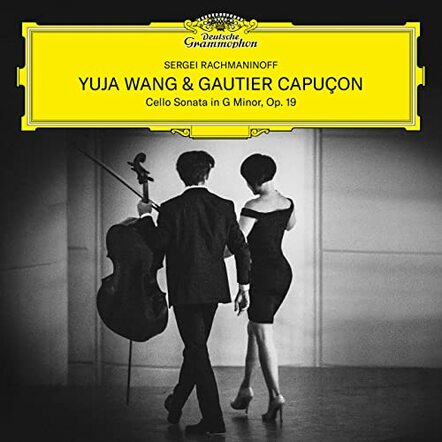New York, NY (Top40 Charts) Rachmaninoff's Cello Sonata Op.19, one of the great landmarks of late Romantic music, has found its ideal interpreters in Yuja Wang and Gautier Capuçon. Their new recording of the work for Deutsche Grammophon projects a partnership of equals fully immersed in the music's turbulent emotions and striking expressive contrasts. Released digitally today, it will also form part of a full album from Wang, Capuçon and clarinettist Andreas Ottensamer to follow next October, on which it will be coupled with Brahms's Cello Sonata No. 1 and Clarinet Trio. Listen below:
https://amzn.to/3xc0eJM
"In the last few years of working together, Gautier and I have developed a way of finishing each other's musical sentences," says Yuja Wang. "The dialogue Rachmaninoff creates in his Sonata is very special, and it felt almost as if his spirit was inspiring us during our sessions in Dortmund this summer." The cellist agrees: "It's always a delight to make music with Yuja," he says. "Everything flowed with such ease with this recording. And there was an electricity in the air that is so rare and so beautiful."
The Rachmaninoff Sonata is a work that makes equally high demands on both players. Revealing the depth of their communicative connection, regular chamber partners Wang and Capuçon convey every dramatic twist and turn of its score, from the darkness and despair of the opening movement to the joyful ecstasy of the finale. Yuja Wang's artistry in Rachmaninoff has been praised for its compelling combination of "astonishing facility" (Gramophone), "exquisitely nuanced playing" (Evening Standard, London) and "devil-may-care glamour and dexterity" (Guardian). Gautier Capuçon, meanwhile, has earned acclaim for performances noted for their striking passion and uncanny range of tone colours.
Rachmaninoff completed his Sonata in November 1901, and its huge emotional range and sense of triumph over adversity reflect the fact that he had finally recovered from the breakdown he had suffered more than four years earlier, following the disastrous premiere of his First Symphony. The Sonata was written for and dedicated to virtuoso cellist Anatoliy Brandukov, who gave its first performance in Moscow in December 1901 with the composer at the keyboard. Because of the work's symphonic scope and the prominence and difficulty of its piano part, Rachmaninoff was reluctant to call it a cello sonata and it was published in 1902 under the title "Sonata for Piano and Cello in G minor". The composer was soon immersed in creating works for the stage, symphony orchestra and choral forces and this proved to be his last and greatest contribution to the chamber music repertoire.
| 























